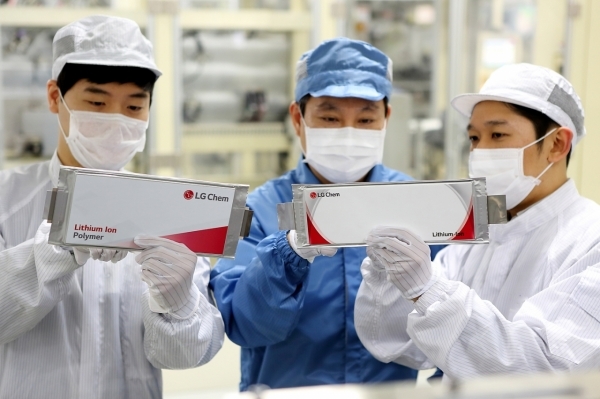
LG Energy Solution has begun the development of lithium iron phosphate (LFP) battery late last year, TheElec has learned.
The technology is mostly used by Chinese companies.
LFP battery is a kind of lithium-ion battery. Instead of using nickel, cobalt and manganese or nickel, cobalt and aluminum as its cathode, it uses iron and phosphate.
Compared to NCM or NCA batteries, it is considered more stable. It rarely overheats and it is rare for electric cars that uses the battery to burn down.
As it doesn’t use nickel or cobalt, it is also cheaper.
The downside is that it is relatively heavier and has lower energy density, shortening the travel distance per charge.
LG Energy Solution has been developing the technology at its lab at Daejeon.
The company will build a pilot line for the batteries next year at the earliest. The battery is pouch type, which will differentiate it from the prismatic and cylinder types made by Chinese companies.
LG Energy Solution is also collaborating with LG Chem for the materials it needs.
LG Chem will likely form a joint venture with a Chinese partner. This JV will likely supply the raw materials needed for LFP batteries to LG Energy Solution.
There was an internal consensus that the company needed to develop its own LFP battery last year, a source said.
The development had somewhat slowed down earlier this year but has gained traction again recently, they said.
LG Energy Solution saw wide adoption of the LFP batteries in low-end EVs, they added.
The company had been against LFP batteries for a long time. This is because LFP batteries has limitation for EV’s main goal right of extending their traveling distance per charge. LFP batteries were also considered unsuitable for the premium car market.
However, last year, Tesla had begun using LFP batteries made by CATL for its Model 3 and Model Y models sold in China.
Apple and Rivian are also expected to use LFP batteries for their EVs.
Still, LG Energy Solution will likely focus its LFP batteries for low-end car models and emerging markets.
Volkswagen is planning to use high manganese cathode for even its low-end electric cars, another person familiar with the matter said.

